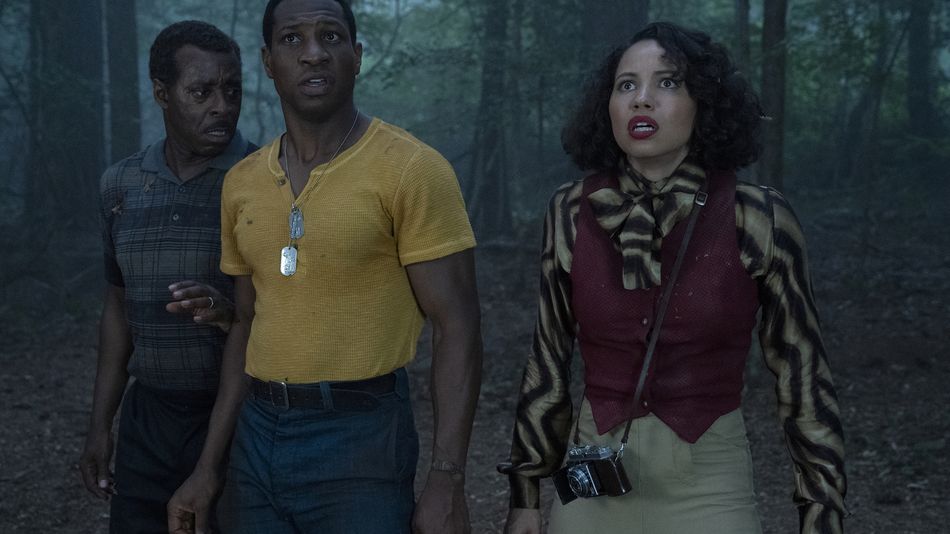
Image: eli joshua ade/hbo’
Howard Phillips Lovecraft was a racist insomniac who couldn’t turn the assumed advantage of being a white man with a few good ideas into anything resembling a successful career. He died in 1937 — penniless, in pain, and alone. His works, the most significant of which were recognized posthumously, have influenced science fiction and horror for nearly a century. The friction between acknowledging his impact on genre and knowing he was a white supremacist of the highest, most repulsive order is difficult to reconcile, but the legal realities of the public domain offer an opportunity to expose and examine his legacy in the modern era.
Enter Lovecraft Country, an HBO show that pays homage to H.P. Lovecraft’s phantasmagoric writing while essentially punching his racist views directly in the mouth, over and over, for hours. His trademarks — spectral horror, the “hierarchies” of life, unknowable beasts, living nightmares, and classic adventure — are summarily yoinked from his dead, white hands and repurposed for a story that centers a surprisingly wide range of Black American characters. Taking place at the height of Jim Crow in the 1950s, Lovecraft Country sends its Black heroes on a wild, spooky ride that references Lovecraft’s work both literally (some in-universe characters are familiar with his stories) and metatextually in the inspired horrors they encounter.
The key word in the above paragraph is “wild”; Lovecraft Country is unpredictable as hell. An early plotline that seems like it would be the setup for the entire season turns out to be the first act in an increasingly twisty, genre-bending ride that doesn’t lose steam even as it accumulates the extra weight of new characters, more plot points, and constant revelations. It would be folly to hazard a guess as to where the show is going from its midpoint, considering the five episodes provided to Mashable for review take so many turns that they end in a completely different place than the season’s opening scenes might suggest. The fact that the show feels exhilarating instead of exhausting is a testament to its strong writing and deftly woven web of mystery.
The fact that ‘Lovecraft Country’ feels exhilarating instead of exhausting is a testament to its strong writing and deftly woven web of mystery.
The horrors Lovecraft conjured in his work are nightmarish and fantastical. Show creators Jordan Peele and Misha Green layer that horror on top of the real, historical terrors of racism. Lovecraft Country deals with the supernatural but never fails to remind its audience that the chilling effects of enormous power are not a ghost story for Black Americans — our boogeymen wear badges, wield authority, and enjoy a standard of peace that only exists at the expense of Black life. Sundown counties, lynchings, and redlining are all present dangers for the characters in Lovecraft Country, and the show does not shy away from the fact that white Americans have always been shielded from the routine hazards Black people still must navigate.
Lovecraft Country stars Jonathan Majors as Atticus “Tic” Freeman, a bookish young veteran whose obsession with science fiction serves him well when he begins to encounter the monsters, cults, and general WTFery that sets the show’s fantastical plot moving. Tic is a capable, vulnerable hero whose need to control his surroundings feels honest and understandable, if a bit frustrating towards the middle of the season — ask for help, Tic! You got friends! Starring with Majors are Jurnee Smollett as Leticia “Leti” Lewis, one of the fiercest leading women to grace the small screen this year; Courtney B. Vance as George Freeman, Tic’s equally cerebral uncle; Wunmi Mosaku as Leti’s talented and furious sister Ruby; and Michael K. Williams as Tic’s father Montrose.
The cast of Lovecraft Country are an incredibly cohesive team. So much of what goes on in the show is bizarre and intentionally misleading, and it takes the full dedication of each person on screen to react accordingly and in character while making time for everyone else to deliver their own performances. There are no scene stealers in Lovecraft Country (Smollett comes close a few times), which in this case is a compliment. Grandstanding has no place in a show as complex as this one, since merely understanding the plot requires careful concentration.
The best thing one can say about Lovecraft Country is that it’s difficult to get a handle on what the show is doing five episodes in. The show does not want to be understood at this point, and the curiosity gap between needing to know what’s going on and having faith that it will all come together is enormous. It is disjointed, with new complications heightening the tension and interest with each passing episode, but the care with which those complications are introduced gives credence to the idea that the confusion is building to something spectacular.
Lovecraft Country knows what it’s doing, even if its audience absolutely will not. The experience of wondering what’s coming will be a rare and exciting addition to late summer TV — with the added pleasure of knowing H.P. Lovecraft is rolling over in his grave every second that the show that bears his name airs.
Lovecraft Country premieres Sunday, Aug. 16 at 9 p.m. ET on HBO.
